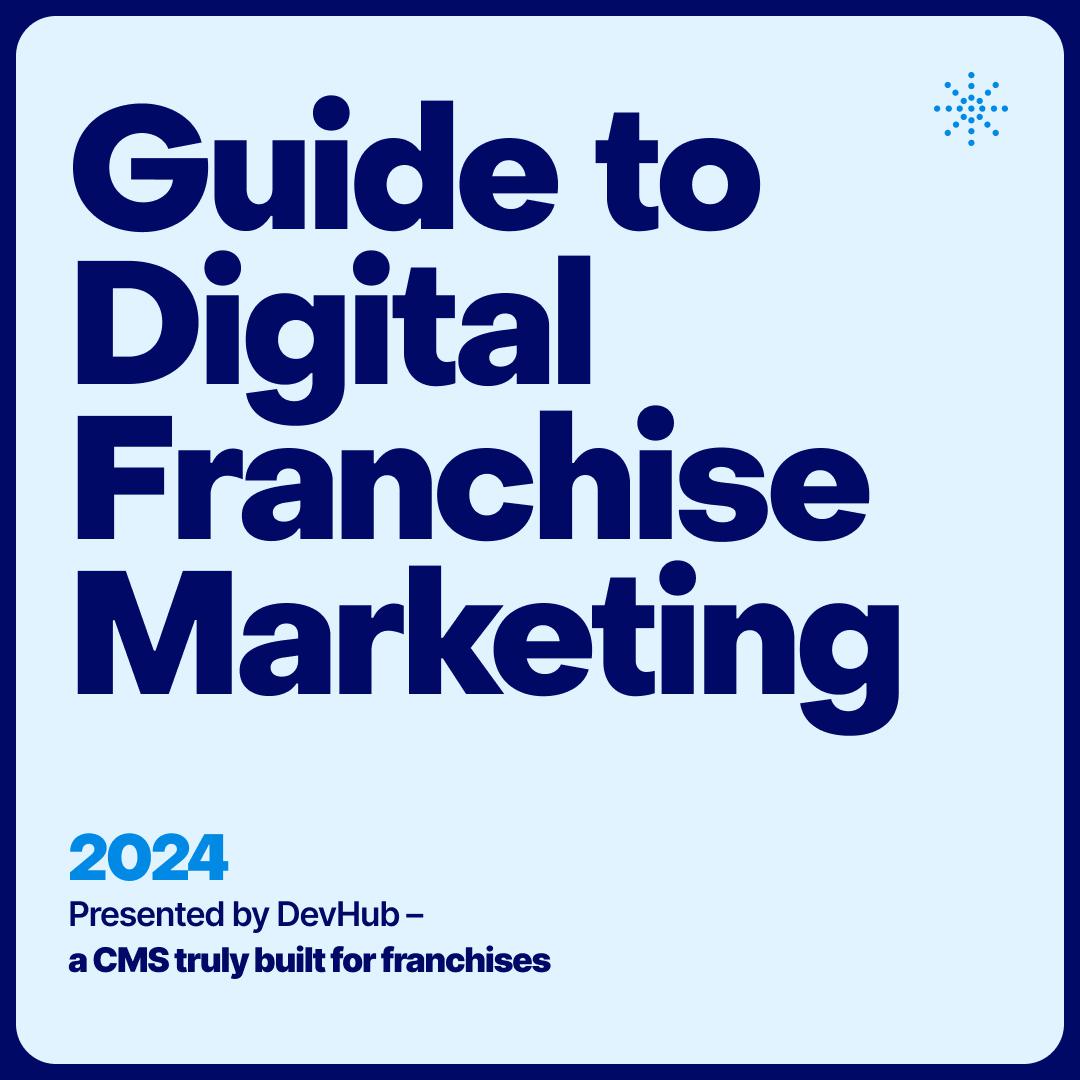In this guide, we’ll explore the emerging trends, best practices, and expert insights impacting franchise marketing.
Estimated read time: 25-30 minutes
- Definitions
- What is franchise digital marketing?
- Types of franchise marketing
- What are the unique challenges of franchise marketing?
- How digital marketing can help franchises
- 8 proven strategies for franchise digital marketing
- Understanding the strategies for each marketing channel
- Franchise development
- What franchise digital marketing software do I need?
- Should franchises manage their marketing in-house or through an agency?
- Conclusion
Introduction to Franchise Marketing
The franchising world has given rise to some of the most iconic and recognizable global brand names. It’s a booming business segment; according to the International Franchise Assocation’s most recent economic report, the total output of franchising was estimated to be a staggering 860 billion dollars, providing gainful employment to approximately 8.7 million individuals worldwide. As the influence of franchising continues to grow, so too does the opportunity for franchise brands to elevate their success and return on investment to new heights. This can be accomplished with a solid and strategic marketing strategy in place.
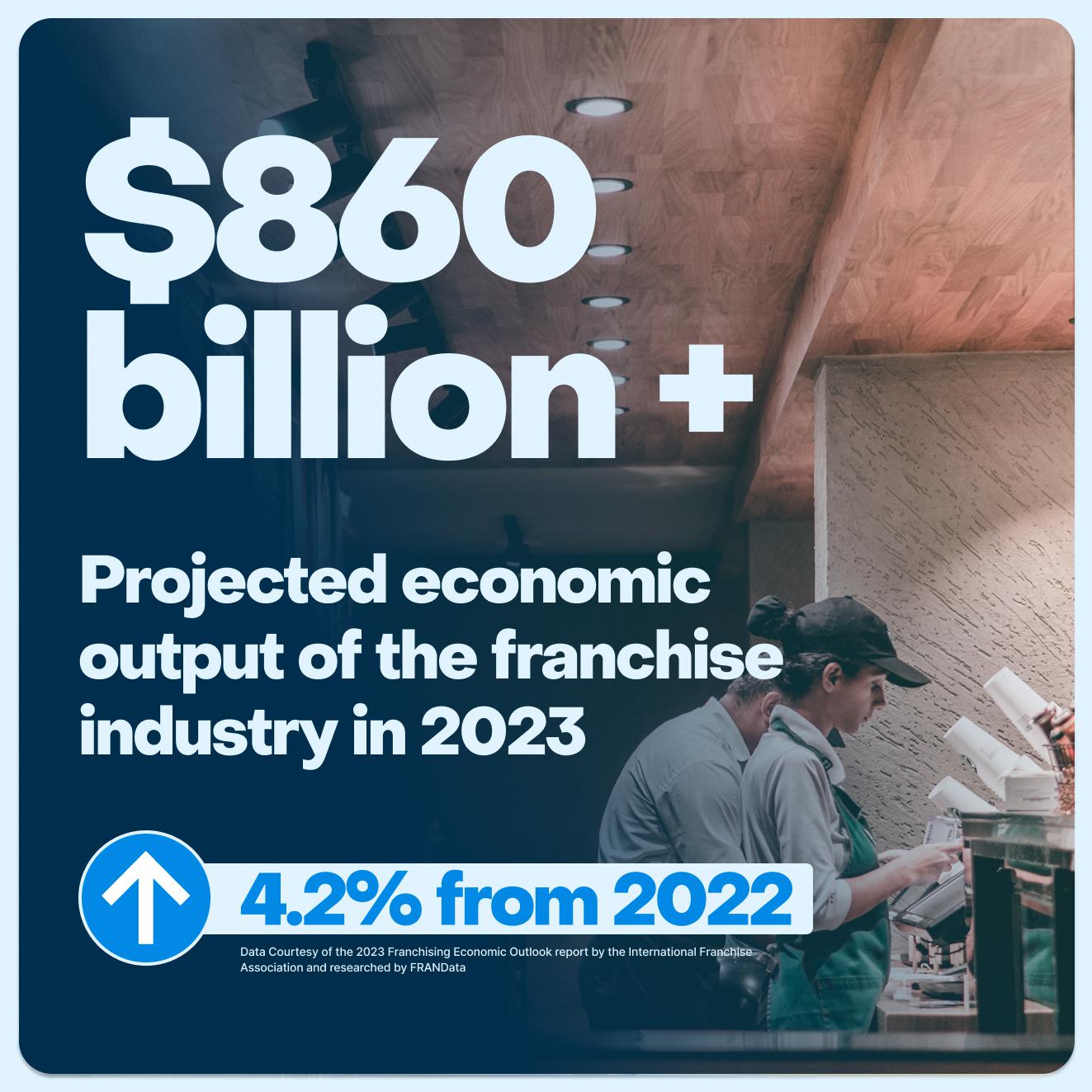
The purpose of franchise marketing is no different than traditional marketing or marketing for any other industry. It has the same desired outcome: to improve brand recognition, increase conversions, and differentiate from competitors. When done right, it can significantly strengthen a franchise brand’s digital presence not only at the corporate level but for each of its individual locations or service areas.
Marketing plays an integral role in this current transformative era, one in which technological advancements are abundant and the digital landscape is more competitive than ever, so the power of a well-executed marketing strategy cannot be overstated. This especially holds true for franchise brands with an abundance of locations, as each needs its own digital presence and discoverability. While the fundamental concepts of marketing remain constant across industries, franchise marketing has unique opportunities that require a seamless blend of innovation, in-depth knowledge, and adaptability.
In this guide, we’ll explore the emerging trends, best practices, and expert insights impacting franchise marketing. We'll dive into the foundational principles that will kickstart your franchise marketing and review innovative tactics tailored for digital transformation. You’ll end this guide with a solid foundation of knowledge and the tools necessary to help your franchise (and individual franchisees) surpass your competition.
Whether you're a newcomer embarking on your journey toward grasping the intricacies of franchise marketing or a seasoned professional ready to refine your skills, let this guide be your go-to tool for successful franchise marketing.
Definitions
The best way to propel your franchise marketing to new heights is to understand the basics. Mastering the basics not only lays the groundwork for strategic decisionmaking and prioritization but also helps you execute your strategy successfully at scale. Let’s define some of the most commonly associated words and phrases a franchise marketer will encounter.
The Franchisee Marketing Funnel
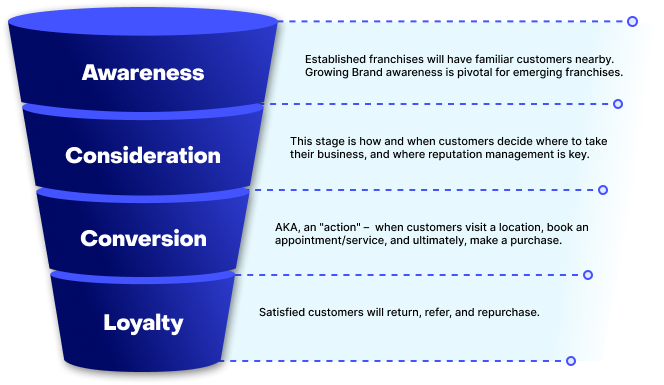
Franchisor
A franchisor is at the heart of the franchise ecosystem. They are the driving force behind creating and expanding the franchise as a whole.
The franchisor is tasked with establishing the business model, brand identity, and operational system to be used at all its business locations. Making each of the aforementioned unique and appealing helps the franchisor better market the opportunity to potential owners, or franchisees, to replicate the same model in other nationwide or global locations. However, the work doesn’t end there for the franchisor. They must also provide consistent franchisee support, education, and oversight to ensure successful implementation of the brand’s values and strategies and alignment across all franchise locations.
Franchisee
The franchisee is responsible for the expansion of the franchise concept, working hand in hand with the franchisor. This individual or entity invests in a franchise license from the franchisor. In turn, this grants them the rights to operate a business using the established brand name, as well as its products and systems. The franchisee benefits from the existing brand recognition and an existing loyal customer base.
Day-to-day management and operations of the specific location are handled by the franchisee, so it is crucial for them to have a deep understanding of franchise marketing in order to grow the location’s perception, visibility, and reputation.
Franchise development
Franchise development entails expanding a franchise’s physical presence via growth in new units or locations. This multifaceted endeavor is strategic in identifying potential markets where the location would be successful, crafting compelling franchise offerings, assessing potential candidates, and establishing new franchise locations. In order to properly vet potential individuals or entities as franchisees, the franchisor must seek and reach out to qualified individuals or entities through relationship building, networking, and more.
Franchise development is key to growing the franchise brand, expanding into new markets, and maximizing return on investment.
Local Page
Local pages are used to build local SEO and highlight the details and features of a particular franchise location. They include everything from the address and phone numbers to hours and social media links. Because local pages drive traffic, this often means more actions - like clicking on the address for driving directions, ordering online, scheduling an appointment, or contacting now. In other words, more traffic equals more awareness, actions, market share, and, in turn, revenue.
Franchisee Sites
A franchisee site, on the other hand, is a multipage site that enables a specific location to expand past a single page to multiple pages related to that location. For example, a landscaper may want to have multiple different pages to highlight the breadth of landscape services they offer, such as lawn maintenance, landscaping, and lawn care. This allows for more relevant, need-to-know information to be presented to the end user, making the content more consumable and engaging.
In terms of franchise marketing, franchisee sites are a great tool to highlight individual franchisee units or service areas. They should include localized content such as job openings or customer reviews, and, when more than one landing page is needed, can showcase limitedtime promotions or a new offering. Franchisee sites are the perfect balance of focused but comprehensive, and its localized capabilities allow for a smooth customer experience and increased local SEO value for franchisees.
Landing page
A landing page is a campaign-based, standalone web page that may serve as an introduction to your brand, a map of the different locations you have, your products or services, events, promotions, or franchise opportunities. Potential customers may end up on your landing page from paid media, social campaigns, newsletter CTAs, and more.
A landing page serves a very specific purpose - it should be informative but persuade users to take a specific action - like ordering a specific product, booking an appointment, downloading a mobile app, or inquiring about pricing.
Your landing page’s content should be relevant to the end user. By eliminating corporate-level jargon and unhelpful content, customers or potential franchisees are more likely to have a positive experience, further explore the page or site, and take the desired action.
What is franchise digital marketing?
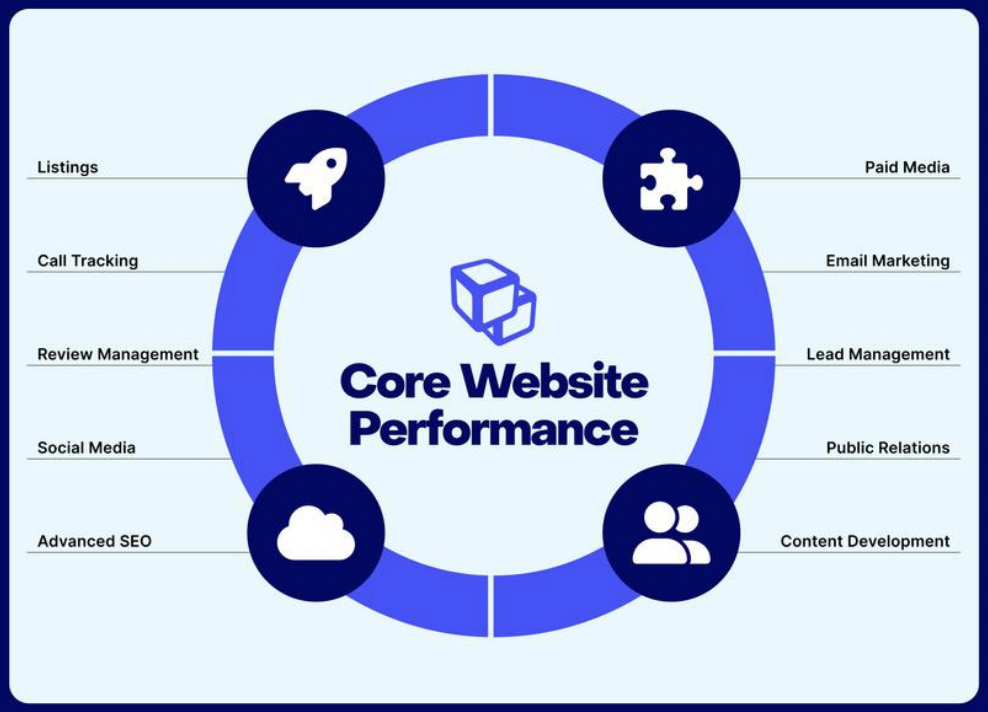
Franchise digital marketing holds the key to unlocking increased visibility in competitive search results, delivering your message to the right target audience, and compelling potential customers to take action. Your digital activation strategy, beginning with your website, can mean more eyes on your products and services and increased conversions -- such as an in-store visit, a purchase online, an appointment booking, a phone call for more information, or a request for driving directions.
Unlike traditional marketing, franchise marketing must take into consideration the balance between maintaining consistent brand identity across all units and allowing for localized marketing copy that adapts to the preferences and needs of specific regions or demographics.
For example, effectively marketing to a customer based in Los Angeles, CA wouldn’t look the same for a customer based in Roanoke, VA. Each region is vastly different in terms of cultures, traditions, values, beliefs, and lifestyles and therefore would require different messaging to connect with each of these diverse regions.
Types of franchise marketing
Operational/consumer franchise marketing
Is any marketing activity that both a franchisor and franchisees do to acquire and retain their customers.
Franchise development marketing
Is any marketing activity that a franchisor does to acquire and retain more franchisees in new markets.
What are the unique challenges of franchise marketing?
Unlike fully owned and operated multi-location brands, franchise brands have the unique dynamic of independent ownership under one shared brand. Effectively, you have a group of small business owners, who might be experts in what the franchise does but are typically not digital marketing experts.
One major concern for franchisors is maintaining control of their digital assets; this can be especially tricky if a franchisee creates their own marketing strategy with little direction. Without a consistent and planned approach to marketing, franchisees may go off-brand or “go rogue” and create suboptimal websites, Google Business Profiles, or hire various marketing agencies in their local markets. This can dilute the brand and create a lot of work later on when trying to consolidate and clean up the brand's image and consistency.
Similarly, franchisors often work with multiple suppliers across all their units, and with so many different assets to manage - at the corporate and local level - visibility is vital. This is especially true when it comes to reporting. Like other businesses, franchisors use analytics to build and adjust their strategy for optimal growth, and location-based analytics allow them to compare unit performance to determine which changes to implement at the brand level.
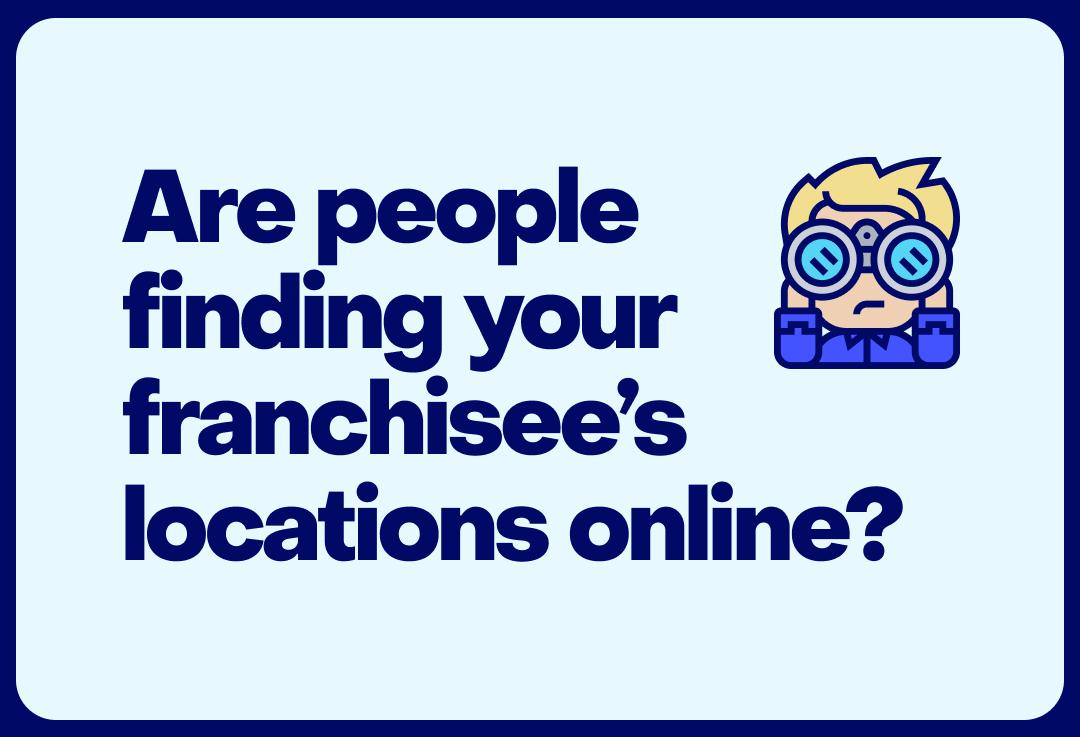
How can digital marketing help franchises?
One of the key reasons franchisees sign on with a franchisor is because it offers a proven business model and brand recognition, as well as operational training and support.
Part of this support includes guiding franchisees in their marketing efforts and providing them with the tools they need to effectively promote their franchise location.
Franchisors that ensure a seamless, consistent experience for each franchisee typically experience high franchisee renewal rates, satisfaction, and more multi-unit ownership.
Franchisees typically rely on the franchisor to provide them with branding guidelines, advertising materials, and promotional strategies that have been proven successful in other franchise locations.
New Franchisee Marketing Checklist:
- Brand guidelines
- Print collateral
- Digital advertising assets
- Social media templates
- Public relations support
- CRM setup and training
- Ongoing marketing support
Ultimately, it is in the best interest of the franchisor to ensure that franchisees are successful, as their success is closely tied to the growth and profitability of the overall franchise system.
8 proven strategies for franchise digital marketing
1. National SEO
What is National SEO?
National SEO (Search Engine Optimization) refers to building and improving a franchise’s online presence to increase performance across the entire country, rather than a concentrated area. National SEO widens the site’s potential reach and can attract users in diverse regions at a nationwide scale. When executed correctly, it gives brands an ongoing competitive edge as they rank above competitors on search engines like Google.
2. Local SEO
What is Local SEO?
Local SEO is the process of optimizing a franchise’s online presence to improve its visibility in local search results - whether it’s for a brick-and-mortar location or a service area. This often involves launching local pages or franchisee sites and optimizing each franchisee’s Google Business Profile for relevant keywords and phrases, building local citations and backlinks, and generating reviews to target traffic in one specific area.

What is the Google Map pack?
The Google Map Pack (below) is a set of three to five map-based results that will often be presented to customers when they search with local intent. Within the Map Pack, customers will see individual businesses and relevant details about that location, including the number of Google reviews and star-rating, a description of the business, address, hours of operation, pricing information, and featured photos. Since these Map Pack links display above the traditional link-based search results (SERPs), having your franchise locations surfaced here for local searches is a major benefit.
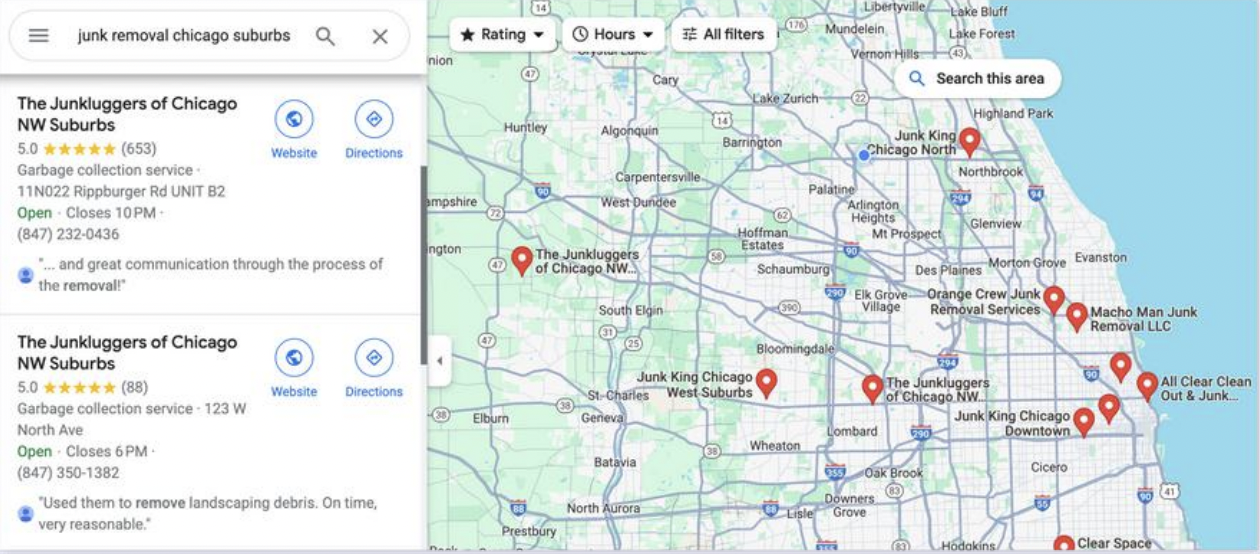
Google Business Profiles for each franchisee
Each individual franchise location will benefit from a dedicated Google Business Profile. This free service enables business units to appear more prominently on Google Search and Maps. When searchers are seeking your product or service, your goal is to have your business appear prominently in the search results.
To ensure you maximize your franchise location’s discoverability and visibility, it’s essential to fully optimize a Google Business Profile. Each profile serves as a digital snapshot of a specific location and highlights pertinent information searchers seek such as your brand’s name and the location address (if there is a physical location), phone number, hours of operation, link to your landing page, and more.
Additional Google Business Profile features to optimize include:
- Google Q&A
- Business description
- Attributes
- Photos
- Products and services
- Posts CTAs (such as scheduling an appointment or booking a service)
- Integrate applicable third-party applications
- Unique features (Google has special tags for women-owned and minority-owned business)
Consumers are able to add photos, reviews, questions, and answers for your business. Monitoring the location’s profile on a regular basis ensures customer questions are answered accurately, (both positive and negative) reviews are responded to), and feedback is monitored to create an exceptional customer experience.
Your Google Business Profile may be the first time a potential customer encounters your brand. You want to make this initial impression worthwhile and drive users to take the next step in their journey with your brand.
On-site Local SEO
It’s true that the Google Map pack is the number one traffic generator for local SEO searches, but below the Map Pack holds significant weight for discovery. Here, you’ll find the traditional text-based search result links for individual websites and a snippet of the associated content.
Building an on-site local SEO strategy is integral for optimizing for these “near me” search results. Developing localized content for that specific location is an essential SEO tactic to increase your site’s chances of appearing higher in the search engine results pages (SERPs).
Targeting long-tail search terms is often your best bet to improve discoverability as these terms often have lower competition yet hold higher purchasing intent.
For example, a customer searching for a “fast casual restaurants near me” may be in the initial discovery stage of their journey, evaluating multiple options. Conversely, if a customer is searching for “impossible burger fast casual restaurants near me”, they’ve likely already conducted research and are closer to completing a purchase.
Video/Webinar: Scaling Success: Secrets to Multi-Location SEO Mastery
3. Your website
Your site is the central hub for most of your marketing activities. It is where you send paid visitors, get organic local visits, and where your customers take actions like placing an online order, booking an appointment, or contacting your franchisees.
What parts make up a franchise website?
Reference diagram below.
- Corporate website
- Franchisee local pages or microsites
- Store locator or location finder
- Landing pages
- Franchise development website
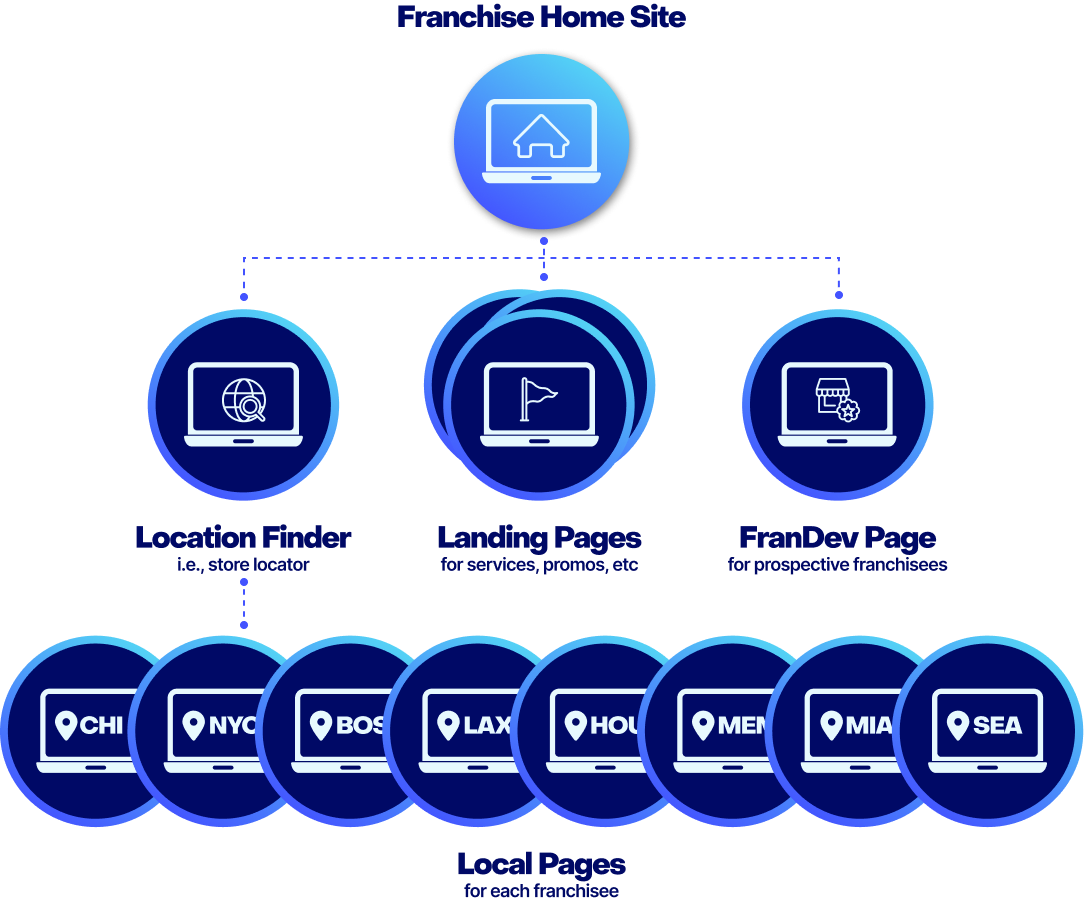
Do your franchisees need local pages or full multi-page franchisee sites?
Deciding if your brand needs local pages or franchisee sites will be dependent on your industry and what types of local searches your customers are using to find you or your competitors.
A quick-service restaurant franchise does not usually need additional pages per location since most customers are just looking to place an online order or see if the restaurant is open, so most restaurant brands launch local pages. For instance, an ice cream shop with 120 locations would launch 120 local pages, each one customized with the franchisee’s specific address, contact info, hours, menu, promotions, services (e.g. delivery or catering), design features (e.g. drive-thru), and so on. Ideally, a local page should also integrate with online ordering and delivery platforms.
On the other hand, service-based brands including home services or senior care typically need a more robust franchisee site with team pages, lead forms, and pages dedicated to each service they provide. Having a localized services page for each location or area helps them rank in more relevant local searches (for instance, if someone is searching for a particular service they offer).
5 SEO essentials for your franchise website
To establish a robust online presence that promotes trust, authority, and authenticity your website must have:
- An excellent and simple user experience
- Strong design with brand consistency
- Mobile-friendly optimization
- Core Web Vitals
- Accessibility and ADA (read blog post)
Why a centralized approach can be beneficial
A centralized approach is beneficial for franchise websites because it offers a consistent and uniform experience for consumers. Whether consumers are looking for information about one of your franchise locations in California or Wisconsin, they’re greeted with a similar visual look and feel.
This level of familiarity helps grow a franchise brand’s online presence and cements its visual identity. The main franchise website can enforce standardized design elements, brand colors, fonts, and visuals, creating a cohesive and recognizable brand identity that customers will easily associate with the franchise.
Other advantages of adopting a centralized approach include:
- Improved SEO: The collective strength of a single website's SEO efforts, including quality content creation and strong backlink acquisition can positively impact the visibility and ranking of the entire franchise network.
- Manage content with ease: Content efforts become streamlined with content creation, publication, and back-end maintenance all handled from a single CMS platform. This helps mitigate errors and enables updates to be made more efficiently.
- Save time and money: Managing a single centralized website is often more costeffective than hosting multiple individual franchise websites for each individual location. It reduces the need for separate hosting, domain registration, as well as ongoing website management costs.
- Improved analytics and conversion tracking: Accessing all your pertinent data within one platform always for valuable insights to be gleaned in a central location. Analyzing consumer behavior and conversion metrics becomes more accessible and actionable for the entire franchise network.
A centralized approach is also useful for repurposing content - especially between your consumer marketing and franchise development efforts. For instance, your customer reviews (right) can be highlighted on your corporate site, your local pages and franchisee sites, and your franchise development sites. Service-based franchises can also display their “before and after” photos on their consumer and franchise development sites.
Even though they are targeted to different audiences (consumers and potential franchisees), they serve the same purpose of proving your concept, differentiating your brand, and building trust.
What URL structure is best for a franchise website?
The URL structure that works best for a franchise website should be designed to create a seamless journey for consumers, be optimized for SEO, and facilitate centralized management.
To accomplish these goals, here’s an example URL structure we’d recommend:
Franchise homepage
www.franchisename.com
Centralized corporate pages
www.franchisename.com/about-us
www.franchisename.com/careers
www.franchisename.com/contact-us
www.franchisename.com/faqs
Local franchisee sites and pages
www.franchisename.com/region/city/
www.franchisename.com/region/city/about-us
www.franchisename.com/region/city/services
www.franchisename.com/region/city/careers
www.franchisename.com/region/city/contact-us
Technical Local SEO
Technical SEO involves a more complex set of strategies to optimize a local website to appear higher in the SERPs. This entails optimizing the technical aspects of a website to enhance its visibility in local organic search rankings. By doing so, search engines are better able to understand the website’s relevance, and authority within a targeted geographic area.
Here are a few ways you can leverage technical local SEO to improve your site’s local search visibility:
- Use local business schema (a type of structured data markup code) to help crawlers better understand your website’s content.
- Improve page speed and other Core Web Vitals.
- Create local pages or franchisee sites for each of your business locations and include that specific location’s contact information, directions, menus, and more.
- Use HTTPS encryption to provide a secure browsing experience for your users.
- Title and meta tags - Create useful and keyword-focused titles and descriptions for each of your pages.
- Maintain the integrity of your site’s link structure by regularly monitoring and resolving crawl errors, broken links, and page performance issues. Google Search Console is a great free tool that offers a bevy of features and functionality to keep your site in top shape.
- Ensure your website is mobile-friendly and has a responsive design so users can effectively navigate and convert on any device they’re using.
- Breadcrumb links within your pages can help tell search engines the hierarchy of your pages and when a URL is focused on a specific franchise location or is a corporate page.
- XML sitemaps list every indexable page within your site and when it was last updated to aid search engines in crawling and spidering your site.
4. Reviews & Reputation
For every franchise brand, it is vital to keep track of their online reviews. But this task is particularly challenging for franchise brands because reviews are spread out across numerous locations, often totaling in the hundreds or thousands. Effectively reviewing and responding to reviews can become challenging at such a large scale.
Keeping up as you scale
With a vast array of platforms available for customers to submit reviews (such as Facebook, Google, and Yelp, among others), it becomes a heavy lift for franchise brands to monitor and respond to reviews without employing scalable software or partnering with an agency.
Review content is a gold mine
Reviews are also one of the best assets that you should leverage inside your Website to build trust with your customers at the national and local level. This comes with the added benefit of a boost to local SEO if it is implemented in the right way using local review schema. If you have ever seen those review stars in Google’s organic search results, this is what you are going after.
5. Paid Marketing
Franchises should follow a similar approach with keyword target, display and video ads. Keep national efforts going, but make sure they’re complemented by local campaigns that focus on consumers within specific locations’ service areas.
The paid marketing channels for franchises that brands focus on the most are:
- Pay-per-click (PPC) advertising on Google and other networks
- Video advertising on Youtube
- Display advertising
- Social media advertising
- Digital out of home
Resource: Interview with Hyperlocalogy about Franchise marketing
6. Content Marketing
EEAT, or Experience, Expertise, Authoritativeness, and Trust, is a crucial component search engines use to rank results. By producing unique and valuable content, you can set yourself apart from competitors, you are building the EEAT that sets you apart from competitors.
Content marketing involves creating various types of content such as blog posts, infographics, guides, and videos. Quality content can not only increase web traffic but also trust - making your audience more likely to engage with your brand and become paying customers.
Experimenting and tracking what content is most engaging for customers will also give you more insights into ways that similar content could be created on the local franchisee level to boost local SEO.
One big advantage that franchise brands have over other multi-location brands is the franchisee. The franchisee can bring that local insight into their territories and the unique value propositions in their market as well as be a content source for your marketing by engaging on social media, recording videos, and participating in local events and causes.
7. Social Media
Social media marketing is an integral awareness strategy that can improve visibility, increase word-of-mouth marketing, act as an engagement tool, and enhance brand presence. For franchises, it's crucial to determine where your target audience spends the majority of their time and prioritize building your presence there. For example, for a franchise brand looking to target a younger demographic, TikTok may be a social network you may want to prioritize since 21% of its global audience are women between the ages of 18 and 24 years.
To ensure consistency across every business location’s social handle, it’s advised to provide franchisees with clear brand guidelines for posting social media content, including visuals, videos, tone of voice, and messaging. This ensures that the brand image remains unified and unharmed across all locations.
However, it’s also advisable to allow franchise partners to meet the preferences of their local community, while still adhering to adopting the brand’s voice. Franchisees or your partner agency should look for opportunities to use relevant local and industry-related hashtags to expand the reach of your posts and attract the right customers.
8. Email & SMS Marketing
Email and SMS marketing remain two of the fastest-growing and most successful strategies for every industry. For every $1 a business spends on email marketing, it can expect an average return of $40.
In a recent study, 71.2% of businesses reported an increased number of customers opting in to SMS marketing. Knowing consumers are becoming more accustomed to receiving texts from businesses and clicking through to learn more, franchise brands are wise to invest in this growing marketing strategy.
To make the most out of a franchise brand’s email and SMS marketing endeavors keep the following tips in mind:
- Personalize your messaging and tailor content based on consumer interests or past interactions with your brand.
- Highlight local promotions, events, and other information that would resonate with the local audience.
- Send consistent newsletters that share updates about the franchise network, new menu items, new promotions, and more.
- Ask your customers to enroll in loyalty programs to encourage loyalty and retention.
- Obtain opt-in consent before emailing or texting a customer.
- Send SMS reminders a day before an appointment to reduce the likelihood of no-shows.
- Share time-sensitive offers via SMS to encourage consumers to take quick action.
- Add a CTA within the text message to direct them to take the next action
Understand the industry-specific strategies for each of these marketing channels
All the strategies we have outlined so far are universal across all franchise organizations, but which strategies will be the most effective for your franchise can come down to your industry. Each industry has specialized tactics and best practices that benefit that specific industry.
From our experience with hundreds of franchise brands, here are some of the industries that can benefit from specialized strategies:
- Home services
- Restaurants
- Spas and salons
- Fitness studios
- Commercial services
Featured guide: 5 Ways to Unlock Hidden Revenue for Your Home Services Franchise via Partial Form Fills
Franchise development
While this guide has been primarily focused on the marketing to attract and retain customers to the franchise and its franchisees, another large part of franchise marketing is related to franchise development and marketing to potential franchise owners.
What franchise digital marketing software do I need?
Lately, more franchises are moving away from allin-one solutions and toward best-of-breed platforms specifically tailored to franchises. This is largely fueled by the desire for freedom and flexibility.
Keeping each aspect of your digital activation strategy agnostic means that you can get the “best of the best” suppliers that are truly experts in their specific discipline (vs. suppliers who can do it all, but not as well). Diversifying your marketing suppliers also prevents you from getting “locked in” to solutions that you’re unhappy with.
Another important consideration when choosing your suppliers is time - a solution that can save your internal team, your franchisees, and your partner agency (if you have one) time means that you can spend those hours focusing on bigger picture initiatives, such as franchisee support and system-wide growth tactics.
Overall, you want to implement platforms that understand how franchise organizations work and are focused on how they can be scalable across all of your franchise locations.
CMS (Content management system) and site platforms
CMS and website platforms enable franchise brands to efficiently manage their online presence, including their main brand website, and individual local pages.
A CMS allows users (dependent on roles assigned and permission levels) to create, edit, manage, and publish digital content on websites. For franchise brands, a CMS serves as a central hub where website administrators can manage content for the main brand website and individual franchise locations any time a new piece of content or update is needed. Different users can be granted different access levels and permissions, ensuring content creation and editing are controlled.
A website platform website platform refers to the technology that powers websites. It includes the hosting environment, software frameworks, and tools necessary to build, deploy, and maintain websites. Franchise brands will benefit from selecting a website platform that allows for easy scalability, customization, and ease of management. A website platform that ensures security, mobile responsiveness, and optimal website performance is imperative to create positive user experiences.
Video: The Best CMS Platforms for Franchise Brands
Listings management
Listing management software can automate the process of updating business information, such as hours of operation, address, phone number, and website URLs, ensuring that the information is accurate and consistent across Google and all other platforms. You want to focus your attention on platforms that allow you to quickly update all your franchisee listings in bulk for things like holiday hours or services/products offered.
Social media management
Managing social media on the corporate side is easily manageable, but having your individual franchisees implement similar content on the local level can be a challenge. Platforms can provide access for franchisees to pre-approved content, templates, and brand guidelines. Franchisees can ensure that their social media content is on-brand and consistent with the franchise's overall messaging.
Paid advertising platforms
When implementing paid advertising for your franchise, you need to balance how much national advertising you are running versus what you do on a per-franchisee basis and you need to do this on every channel (PPC, Display, Social).
Optimally you want a platform that can power both the local, regional, and national advertising spend all from one software. Depending on your franchise model, who pays for the advertising (the franchisor, the franchisee, or a combination of both) can quickly rule out some platforms.
Local SEO tools
Understanding what customers are searching for and if your Franchisee locations are showing for those searches in your local markets can be a black box. Without software to help you track this across all your franchisee locations, it is hard to know what is and is not working in your local SEO strategy.
These tools allow you to keep a close eye on your rankings for local search, maps, organic results, and mobile searches. With these insights, you can be informed about the performance of your local SEO efforts and make data-driven decisions to improve your rankings and visibility in local search results.
Should franchises manage their marketing inhouse or through an agency?
Some franchise organizations take the leap to build their own internal marketing and web teams, but the costs of those resources can be significant for emerging and established brands alike.
Alternatively, some brands opt to outsource all their marketing to a franchise marketing agency that in turn utilizes their own set of software and tools to execute the strategy on your behalf.
We believe that a hybrid approach is the killer strategy for franchise brands. This allows your team to bring your brand expertise and to lean into certain aspects and processes but step aside to let subject matter experts implement best practices from their experience with dozens of other franchise brands.
Conclusion
Franchise digital marketing comes with its own unique set of challenges and nuances that set it apart from other industries. As such, it’s crucial to gain a holistic understanding of the marketing tactics and strategies that work best for franchise brands in order to maximize your potential for growth and success.
This comprehensive guide has laid the foundation for understanding the essential components of franchise digital marketing, from understanding its unique opportunities and challenges to maximizing your digital presence through proven strategies.
Franchisors won’t win and thrive by applying generic marketing principles. The path to success relies on tailoring marketing strategies to fit the intricate needs of franchise businesses and their local customer bases. From optimizing content for national SEO to local SEO to determining whether your franchise will benefit from local pages or f, each aspect plays a key role in extending the reach and online presence of each franchise location.
Embracing the aforementioned strategies creates a clearer roadmap towards boosting visibility and cultivating a strong community among franchisees, empowering them to effectively market their individual locations. With each location working harmoniously and in alignment with each other, franchise success is amplified.
As you navigate the complex world of franchise digital marketing, we’re here to help. Schedule a demo to experience the DevHub Difference for yourself.

